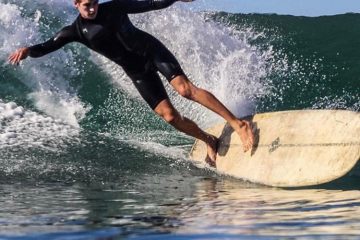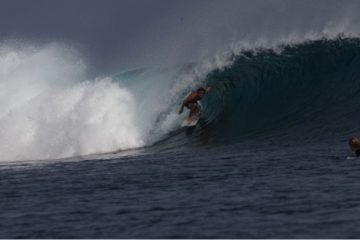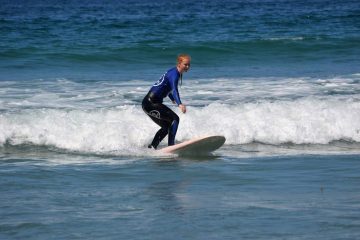When a Task Becomes a Passion
When I first saw Erin Tyburski, it honestly didn’t make sense. She strolled up to the table where I had told her to meet me, swinging a pair of keys in her hand. She wore a Delta Gamma sorority sweatshirt, cropped jeans, and boots. I thought to myself, “There’s no way this girl is a surfer.”
But she is. And not just a, “I just surf for the Instagrams” kind of surfer. Tyburski is a real-deal, catches-waves-every-weekend kind of surfer. Guess you shouldn’t always judge a book by its cover; I guess maybe I’m still stuck on the Spicoli stereotype.
Growing up in Encinitas, California, Tyburski spent a lot of time at the beach. Like many kids who grew up in the San Diego area, her childhood memories are mostly a blur of sunscreen, sunburns, and saltwater up her nose.
“I practically grew up in the water,” Tyburski said. “I know literally everyone who surfs says that, but I was seriously always in the ocean.”
Tyburski’s introduction to surfing started like that of most Southern California children: with private lessons. She started when she was six years old, wearing a hot-pink Ripcurl rashguard and floral boardshorts. At this point in her life, surfing was more of a task, something that she did to please her parents– but never something that she actually enjoyed doing. Surfing in Encinitas, it seems, was the equivalent of the mandatory piano or ballet lessons that other kids have to deal with. Instead of galavanting around in a pink tutu, Tyburski was walking along the shore with a surfboard tucked under her arm.
“I wasn’t the athletic type, you could say,” Tyburski said, smiling, “so this was the closest thing my parents could get me to do that required minimal effort on my end. Like, most of the time I just kind of sat and floated on my board. It really annoyed my instructors.”
“Then when did the task become a passion?” I asked.
“Oh, when I almost drowned.”
At age eight, when Tyburski was a few years into these — in her words — “pretty dreadful” surf lessons, she had a truly near-death experience. While in the water, Tyburski’s surf instructor was called to the shore by the lifeguard, probably to answer a question or help carry some equipment. He left Tyburski in the water, something that he had done before. She was told to stay still and wait for him to return. Waiting wasn’t really something that eight-year-old Tyburski was particularly interested in, so she splashed, rolled onto her back, and jumped around.
“Then it’s all pretty much a blur,” she said, “I honestly don’t remember much.”
She recalls suddenly feeling like she was on the “speed cycle of a washing machine,’” tossing and turning and unable to decipher the ocean surface from the ocean floor. She thinks she “blacked out,” but admits it could be a mixture of her body being stressed and simply forgetting what happened since it was so long ago. Before she knew it, she was strapped to a gurney and being hauled into the back of an ambulance.
“For a while, that was it for me. Like, the thought of even getting near the beach was nauseating — I would think about it and I could literally feel my lungs filling with water. And my parents practically threatened to me disown me if I got back in the water, so I just stopped surfing completely,” she said.
But then, things changed. Tyburski woke up one morning with an intense itch to get back in the water — a feeling that was so foreign since her incident. “It wasn’t just that I missed surfing. I actually don’t think it was that at all. I realized that I was alive and healthy, and in the simplest form, I just really didn’t want something to beat me.”
And so, that was her turning point. From here on out, surfing was something that Tyburski saw as a lifestyle and a passion; something that drove her to continue improving and learning.
“My relationship with surfing is about surfing but at the same time not at all about surfing. Does that make sense? It’s not the sport. I just didn’t want something to beat me.”


